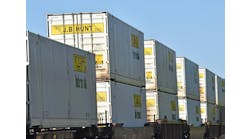Despite Bill Zollars' repeated reassurances that YRC Worldwide (YRCW) recognizes its volumes, margins and cash flow have all continued to decline, and it has a plan to turn the company profitable, the story is wearing thin.
In his most recent statement accompanying the company's second-quarter earnings, Zollars, chairman, president and CEO of YRCW, said that as a result of the company's focus on improving efficiencies and integrating the operations of Yellow Transportation and Roadway, “We recorded some significant charges that we believe are not reflective of the underlying operating results of our company. Although we will continue to enhance the efficiencies of our networks, we do not expect to record charges of this magnitude going forward.”
The loss YRCW reported was $369 million for the second quarter. Excluding the significant changes Zollars refers to, the loss reported was $255 million.
David Ross, analyst with Stifel Nicolaus stated, “YRC's 2Q09 financial losses were abysmal, but cash flow is what is important at the moment, in our opinion. Unfortunately for YRC, cash flow remains significantly negative and could remain so even if wage/pension concessions go through.”
Ross is referring to concessions YRCW negotiated with the International Brotherhood of Teamsters (IBT) which are currently with the union membership for ratification and modification. That vote, which was endorsed by the IBT management, was expected to be completed in early August.
The “We have a plan” mantra appears to be wearing thin with Ross. He says, “The theme of at least the last several YRC quarterly earnings releases and conference calls has been–'We know the numbers and trends look bad, but we've got a plan. Things will be better.' And what has happened? Volumes, margins, and cash flow have sharply declined. It's not just the economy; it's the company–YRC is performing worse by far than any of its competitors.”
The quarterly report indicated YRC National Transportation saw total shipments per day fall 37.1% and total tonnage per day was down 39.4% in the quarter. “The company continues to right size its network to support current and future shipment volumes,” it said. Total revenue per hundredweight, including fuel surcharge was down 13.1%, when adjusting for rerates of $12 million not attributed to the second quarter revenue, and down 14.2% without adjusting for these items. Excluding fuel surcharge and adjusted for $12 million in rerates, total revenue per hundredweight for YRC National Transportation was down about 1.5%.
At YRC Regional Transportation, total shipments per day were down 22.0% and total tonnage per day dropped 26.4%. Total revenue per hundredweight, including fuel surcharge, was down 11.9%. Excluding fuel surcharge, total revenue per hundredweight for YRC Regional Transportation was down about one percent for the quarter.
Anecdotal reports also indicate shippers have been moving freight to other carriers, though YRCW continues to claim it is winning new business. In its last conference call before the quarterly earnings announcement, YRCW management admitted to some freight diversions which it said were largely due to concerns over the impact of the integration of Yellow and Roadway operations. That business, Zollars reassured at that time, was beginning to return.
Examining some of the details of a Securities Exchange Commission (SEC) 8K filing by YRCW, David Ross highlighted some changes in the company's executive severance policy, suggesting there could be management changes in the future. “These changes point to the banks' and the board's willingness to let the company try what it can, including changing out some of the existing management team, to improve operations,” said Ross.
The company's filing noted, “YRC Worldwide also reported aggregated cash and available unused capacity under the credit facilities of $218 million at June 30, 2009, including $165 million of cash and cash equivalents. In addition, the company had $95 million in the revolver reserve created pursuant to the company’s credit agreement at June 30, 2009. The company completed $127 million of sale and financing leaseback transactions and closed on $14 million of excess properties during the second quarter.”
The statement further noted that YRCW reported an equity investment impairment of $30 million which it said was related entirely to the company’s August 2008 65% investment in Shanghai Jiayu Logisitics. The write-down, explained YRCW, was “primarily a result of the declining economy in China and around the world.”
The company counts as progress on its plan, the finalized amendment to its credit agreement with its lender group. “The amendment eliminates the third quarter 2009 earnings before interest, taxes, depreciation and amortization (EBITDA) covenant and establishes a fourth quarter 2009 EBITDA covenant of $15 million and a first quarter 2010 EBITDA covenant of $20 million,” according to the filing.
Further, YRCW reported it can retain 100% of asset sales between July 31, 2009 and August 31, 2009, up to $50 million (subject to certain conditions) and the minimum liquidity covenant during that same period has been eliminated.
YRC Worldwide has reached agreement with the company’s International Brotherhood of Teamsters multi-employer, defined-benefit pension funds to provide certain of the company’s real estate as collateral in lieu of pension contribution payments during the second quarter. The company previously announced that it had finalized agreements with funds totaling $94 million, and the remaining funds have joined as participants in the same agreement for a total deferral of $128 million.
The company’s employees represented by the IBT are currently voting on modifying their labor agreement with YRCW. Upon ratification of the modification, the company “expects an immediate benefit to monthly operating income and cash flow of approximately $45 million per month, increasing to $50 million per month in 2010.”
The company expects gross capital expenditures of about $65 million in 2009 and over $100 million of cash proceeds from sales of excess properties. Sale and financing leaseback transactions are expected to generate over $300 million of cash proceeds in 2009. “Excluding payments related to sale and financing leaseback transactions, we expect interest expense of approximately $35 to $40 million in the third quarter of 2009.”
Zollars expressed some optimism that, “We have seen signs of encouragement in the economy including stabilization in our absolute volumes, though we think it is too early to confirm that this is the bottom of the recession.” He added, “We remain optimistic that economic improvement could happen earlier than expected but we do not have it reflected in our financial plans until we progress through 2010.”
What does it all mean? Logistics Today's take is that in this business, uncertainty kills. A carrier perceived as having an uncertain future is perceived as a risk and shippers and consignees (as well as third party logistics providers) will begin to migrate business to other suppliers they perceive as having a stronger position or more certain future. This can turn the perceived risk into a self-fulfilling prophecy. Implications that there could be management changes in the works are a mixed blessing. If the recovery plan is a solid one, these are the architects, engineers and implementers of that plan. Can it deliver on all of its promises without the guidance of certain key executives? On the other hand, if the plan is not perceived as strong and capable of delivering results, a change can be perceived as positive. But regardless of how senior management changes might be perceived, any transition will create uncertainty, and shippers don't like uncertainty.
What's your take? Join the discussion at YRC's Future. . .your take?
To read more articles from the current issue of Logistics Today digital edition, click here.


